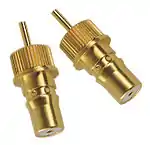QMA and QN connector
QMA and QN connectors are quick-connect RF connectors that were designed to replace the widely used SMA (used in low power transmissions; DC–18 GHz) and Type N (used in medium power transmissions; DC–11 GHz) connectors. The connectors have been available since 2003. The connector family was created by the Quick Lock Formula Alliance, which consists of Huber+Suhner, Radiall, Rosenberger Hochfrequenztechnik, and Amphenol.
 QMA connector | |||
| Type | RF coaxial connector | ||
|---|---|---|---|
| Production history | |||
| Designer | Quick Lock Formula Alliance | ||
| Designed | 2003 | ||
| Manufacturer | Various | ||
| Cable | Coaxial | ||
| Passband | Typically 0-6 GHz | ||
QMA[1] and QN[2] connectors are the quick lock version of SMA and N connectors. This design can save much handling time because it allows quick mating and demating without tools. Due to the smaller overall size, it can save the operating space and allows for high density arrangement. To make cable routing easier, it can rotate 360 degrees after installation.
Design goals
The design had three main goals:
- replace the traditional threaded connection of SMA and N with a snap-fastening to allow for faster mating and de-mating and eliminate the need for a torque wrench
- decrease the overall size of the connector while still matching the electronic performance and reliability of their extremely popular predecessors
- allow for 360° cable rotation after installation in order to make cable routing easier.
Applications
Common applications for the QMA and QN connectors include cellular base stations, antennas, and various defense applications. Since an industry standard for quick-locking SMA and N connectors has yet to be established, varying designs are currently being manufactured.
Mini-QMA connector
The Mini-QMA is a quick-locking SMA (QMA) replacement that was designed with panel mount and printed circuit board (PCB) applications specifically in mind; the length of the Mini-QMA being the shortest of any QMA connector on the market to date. This miniaturization, in addition to its snap-on coupling mechanism and electronic performance equivalent to SMA up to 18 GHz, make the Mini-QMA an excellent choice for applications in which space is limited but performance is required.
References
- "Coax Jumper of QMA Connector". Vcablemart.
- "Coax Jumper of QN Connector". Vcablemart.